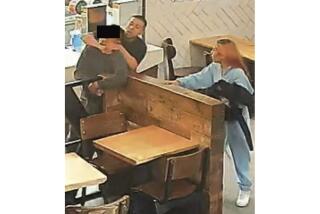County Drug Bust Details Told in Court
One of the four men captured during the seizure of 171 kilograms of cocaine this week in El Toro tried to eat a slip of paper that had been seized as evidence after he was placed under arrest at his home, according to legal documents unveiled Thursday during the arraignment of the four.
As a result, a Los Angeles magistrate who had been considering a motion to dismiss charges against the man, Mario Alfredo Lopez-Martinez, 28, rejected the dismissal motion and a petition for bail, contending: “That’s tantamount to a confession.”
The incident was one of several that surfaced in court documents as Lopez-Martinez and two others, Jose Eugenio Ramirez, 44, and Gilberto Valencia, 28, were arraigned in Los Angeles federal court in connection with the seizure of the cocaine in El Toro.
Arrest Incident
According to a sworn affidavit by FBI Special Agent Lee C. Rasmussen, Lopez-Martinez tried to eat a slip of paper seized as evidence after he was placed under arrest at the home, located at 25365 Gemini Lane in El Toro.
“(Federal) agents placed a paper on a table near where Lopez-Martinez was sitting,” the affidavit said. “When he saw the paper, Lopez-Martinez grabbed the paper and tried to swallow it. It was removed from his mouth. . . .”
Defense attorney Michael Abzug contended, however, that the paper contained the telephone number of Lopez-Martinez’s brother, who, Abzug said, was not involved in drugs. “He just didn’t want to get his brother involved,” Abzug argued.
Brown, who up to that time appeared to be of the mind that there was no direct evidence linking Lopez-Martinez to the drugs, valued at $50 million, then rejected the defendant’s motion for dismissal and a petition for bail.
The arraignment for a fourth man arrested in connection with the seizure, George Barrera, 27, was delayed until Monday morning.
The El Toro arrests were part of a string of raids staged in Orange and Los Angeles counties Tuesday night and Wednesday morning by federal and local narcotics investigators. More than 400 pounds of cocaine, weapons and $2 million in cash were seized.
Last week, 10 suspects were arrested and more than 1,700 pounds of cocaine were seized in Orange County in what authorities said was the largest cocaine bust in California history.
Unrelated to Earlier Raid
Assistant U.S. Atty. R. Crosson Andersen, who handled the arraignments Thursday, said it appeared that the El Toro raid was not related to the one last week.
According to two affidavits by FBI Agent Rasmussen, Ramirez, who was arrested at his home in Laguna Hills, admitted to federal investigators that he received a “salary of $4,000 per month” for acting as a carrier for cocaine traffickers.
“He . . . told (FBI) Special Agent (P. Michael) Dunbar that he would receive pages on his beeper and would call back and thereby receive instructions regarding delivery of either cocaine or money,” one affidavit said.
In court Thursday--in front of his sobbing wife and two children--Ramirez admitted that he was a “mule” for cocaine traffickers.
About $2 million in cash and five pistols were seized at Ramirez’s home in the 22500 block of Caminito Esteban. According to court documents, Ramirez admitted that the cash “represented the proceeds of the sales of narcotics.”
Federal investigators were at a loss to explain the candor of Ramirez’s statements to agents. “I don’t know why,” one federal agent said, “but we’ll take them.”
Agents Sifted Trash
The court documents also told how federal and local agents, who had the four defendants under surveillance for several months, sifted through the trash of a Los Angeles County home to build a case against them.
On six occasions, trash was collected from a home on the 14400 block of East Marwood Avenue in Hacienda Heights. Investigators found money wrappers for $50 and $2,000 bills, plus portions of two separate adding machine tapes with two figures written on them--713,300 and 2,066,289. Authorities said these figures represented amounts of money paid for cocaine sales.
More to Read
Sign up for Essential California
The most important California stories and recommendations in your inbox every morning.
You may occasionally receive promotional content from the Los Angeles Times.









